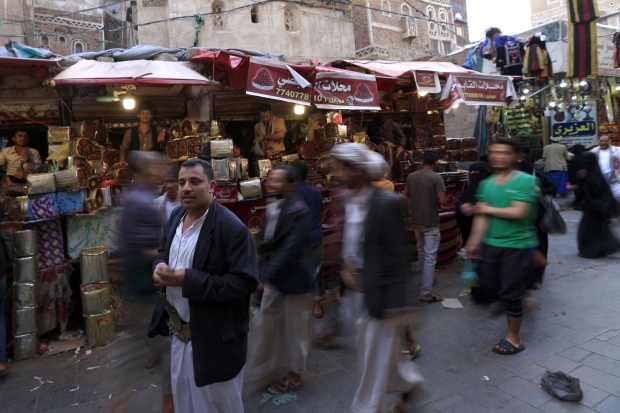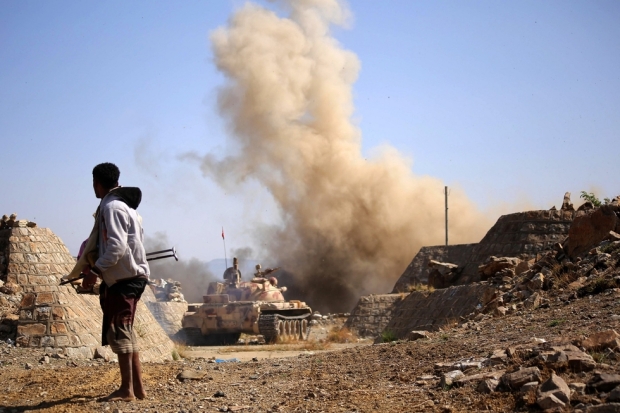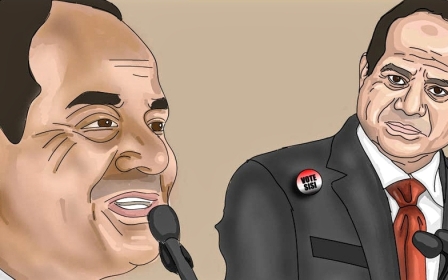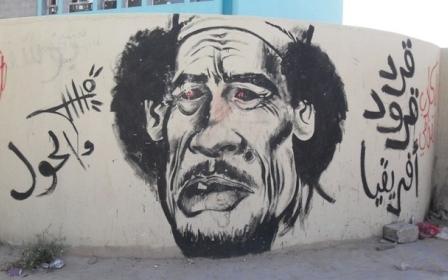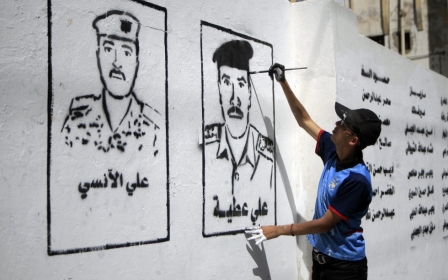Insults during the holy month: How Ramadan comedy turned political in Yemen
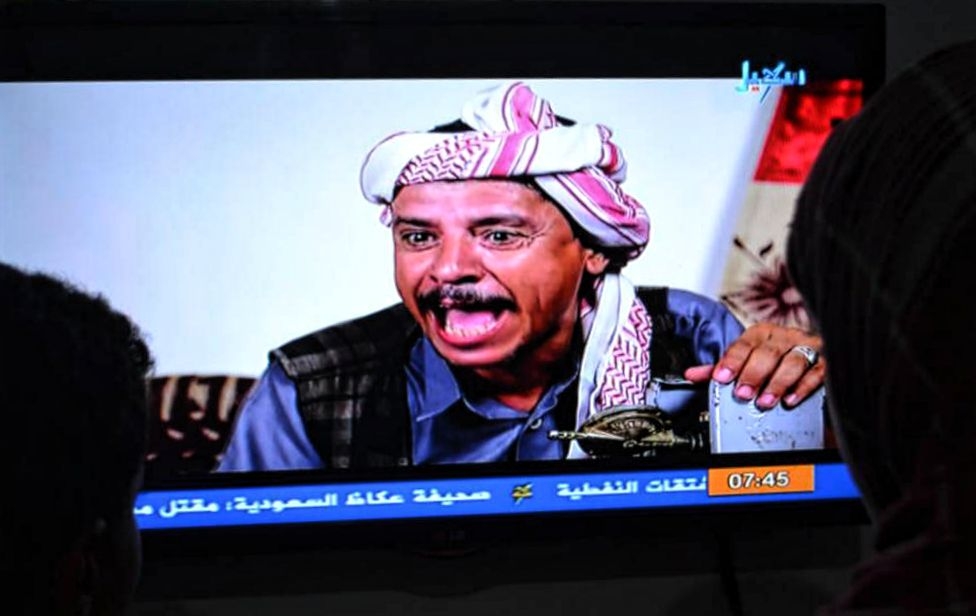
TAIZ, Yemen – It’s a tradition in Yemen during Ramadan, just as it is in other parts of the Muslim world: after a day of fasting, families eat, then gather around to watch TV especially made for the holy month.
Often, they're comedy shows: humour focuses on common problems associated with the festival, such as buying more food than you need, being woken by neighbours while you try to sleep during the day or domestic quarrels fuelled by fasting.
But a new style of humour has caught fire in Yemen since the start of the civil war in 2015 – and many people don’t like it.
'I’ve forbidden my children to watch those kinds of shows because they teach our children how to insult people and be spiteful to people'
- Mosab Qaderi, bus driver
The politics of the three-year conflict, which has killed more than 10,000 people, has started to seep into popular entertainment and manifested itself as satirical attacks on opponents.
Mosab Qaderi, 35, is a bus driver and father of three in Taiz. He said that before the war his family would excitedly wait for the Ramadan comedy shows. Not now.
"I’ve stopped watching the Yemeni style of cheap Ramadan comedy,” he says. “I’ve forbidden my children to watch those kinds of shows because they teach our children how to insult people and be spiteful to people."
He cited a comedian who, on the first day of Ramadan, described the Houthis as the shoes of their ally Iran. Comparing someone to a shoe, the item of clothing most in contact with dirt, is regarded as a grave insult in many Middle Eastern cultures.
Qaderi says he has no political allegiances but adds: "We need comedy that creates joy without insulting anyone and without using dirty words to describe people.”
Now he and his family watch international comedy instead – usually Egyptian or Lebanese programming - as homegrown shows "do not respect the audience”.
Insults from day one
Humour in Yemen is built around TV (there are no comedy clubs), with the focus on slapstick and sketches.
The ministry of culture takes responsibility for the arts, to the extent that many of its employees are actors. Usually, if material is deemed to be offensive, then the ministry would intervene and sometimes censor it.
Few TV channels and comedians now work from Yemen. Only Houthi TV channels – which used to be owned by the government until the fall of Sanaa in 2014 - are still based in the country. The government and the Islah party, which has strong links to the Muslim Brotherhood, broadcast from overseas, often from Saudi Arabia or Turkey.
Comedians can try YouTube – but it’s tough. Even before the war, broadband speeds in Yemen were slow and costs high. That’s now worsened: if anyone wants to watch YouTube, then they can only really do so either early in the morning or late at night when less people are online.
This year, comedians started insulting rival sides from the first day of Ramadan. The response from political and social activists was instant.
For example, T Mohammed al-Rube, an Islahi comedian on Yemeni Youth, described the followers of former president Ali Abdullah Saleh, who was assassinated in December 2017, as having been “Photoshopped”.
Ali Al-Boukhaiti, a pro-Saleh supporter, responded in scathing terms:
Translation: The Yemen Youth TV channel is pathetic. Al-Rube is useless, looking for two cents. OK, you bastards, where are the crowds of the Siteen Street? Ali Abdullah Saleh fought a battle, as for Yadomi and the Brotherhood they didn’t even shoot a single bullet. [The Yemen Youth TV channel] are a bunch of sick people holding grudges, with no vision or prospects.
His comments disparaged the crowds of Islah supporters who used to protest on Siteen Street, as well as Muhammad Al-Yadomi, leader of the Islah political movement.
Abdurrahman Ahmed, 45, a teacher in Taiz, believes that Ramadan comedy has become another front in the war – and potentially one that's more dangerous than the armed conflict.
"Only supporters of the warring sides watch and react to such kind of drama. Most people are not happy to watching the new kind of Yemeni comedy."
Ahmed says that he preferred the type of shows which were based on everyday life, such as al-Saheer Saber (Saber's Brother-in-law), Hami Hamak (We Have The Same Problems), and Dihbash, about a man with no direction in life.
"I used to prefer Yemeni comedy because I felt it addresses our social problems in a good way and it gives solutions in a great way. But today everything has changed."
In defence of the new comedy
The new strain of humour has its defenders, however. Mohammed Ridha, an Islahi member living in Taiz, says that the current crop of comedians and shows are only reflecting the everyday realities of a society dominated by war. "The cultural war is half of the war and the media war is the most important part of the war,” he says.
He blames the Houthis for the war and social problems which have come with it, including poverty and marital break-up: humour simply highlights it. “The comedians and the pro-Hadi channels do their best to reflect the real picture of the Houthi rebels.”
Yemeni comedy
Interviewer: Are the Houthis your hands in Yemen?
Iranian cleric: No, they're our legs
- Suhail TV channel (pro-Hadi channel)Comedian: Tareq is the only guard in the world who escaped and his boss was killed
[Tareq Saleh was guarding his uncle, President Ali Abdullah Saleh, when he was assassinated]
- Yemen Youth TV channel (pro-Hadi channel)Comedian: The Saudi Patriot missiles spot the Houthi ballistic missiles before they are fired. But the problem is that the Patriot missiles think it's their job to play with the Houthi missiles and chase them. The Patriot missiles and the Houthi missiles are like friends, they don't hurt each other
- Yemen TV channel (pro-Houthi channel)
Hussam al-Hashimi, 34, a shopkeeper in Sanaa, says that he liked humour which targets "aggressors and their mercenaries", a reference to the Saudi-led coalition and its supporters.
"Comedy is a good way to highlight the crimes of the aggressors,” he says, “so the message will reach huge number of people, including women and children in their homes."
He says that the Houthis do not insult Yemenis, such as Islahi supporters, but rather the "killers" of Yemenis.
No market for Yemeni shows
Zakaria Dahman, a Yemeni TV producer and the founder of Vision Company, based in Sanaa, used to make comedy. But since 2015, he says, Yemeni channels have been less interested in content which does not promote their cause.
International markets are also out: like much comedy, Yemen's style of humour tends to be very local and does not travel. He now makes shows, usually dramas and documentaries, for international channels such as the UAE-based al-Ghad al-Mushreq.
Dahman is against any political intervention in comedy. "The political sides control comedy and the media in general,” he says. “Instead of making good comedy, its purpose now is to create racism and hatred among Yemenis."
Comedy in Yemen, he says, is now weak and has no meaningful purpose other than to attack the opposition, and while political satire may have its place, the warring sides are failing to use it properly.
'There are now more than 13 Yemeni TV channels creating hatred and enmity among Yemenis and avoiding discussing social issues'
- Zakaria Dahman, TV producer
"The owners of the TV channels are only interested in politics. There are now more than 13 Yemeni TV channels creating hatred and enmity among Yemenis and avoiding discussing social issues. There is no space for social comedy which discusses social issues positively.”
Saeed – who cannot give his real name for fear of reprisals – is a comedian who works at the ministry of culture. He tells MEE that when war broke out, comedians and actors sided with one side or the other.
““My direct manager in the ministry is acting nowadays on TV and every day he insults Yemenis for the sake of money," he says. "Others like me stopped working because we do not want to betray our profession," adding that he would rather not work and starve than insult others.
He would only return to comedy, Saeed says, when it regains its independence.
For his part, Qaderi simply wants to see the offending TV channels shut – and a return to the usual style of Ramadan comedy.
"Yemen is full of suffering and our children are suffering from many problems. We hope that the government closes these low channels that create cheap shows which have such a negative influence on the children."
This article is available in French on Middle East Eye French edition.
Middle East Eye propose une couverture et une analyse indépendantes et incomparables du Moyen-Orient, de l’Afrique du Nord et d’autres régions du monde. Pour en savoir plus sur la reprise de ce contenu et les frais qui s’appliquent, veuillez remplir ce formulaire [en anglais]. Pour en savoir plus sur MEE, cliquez ici [en anglais].


